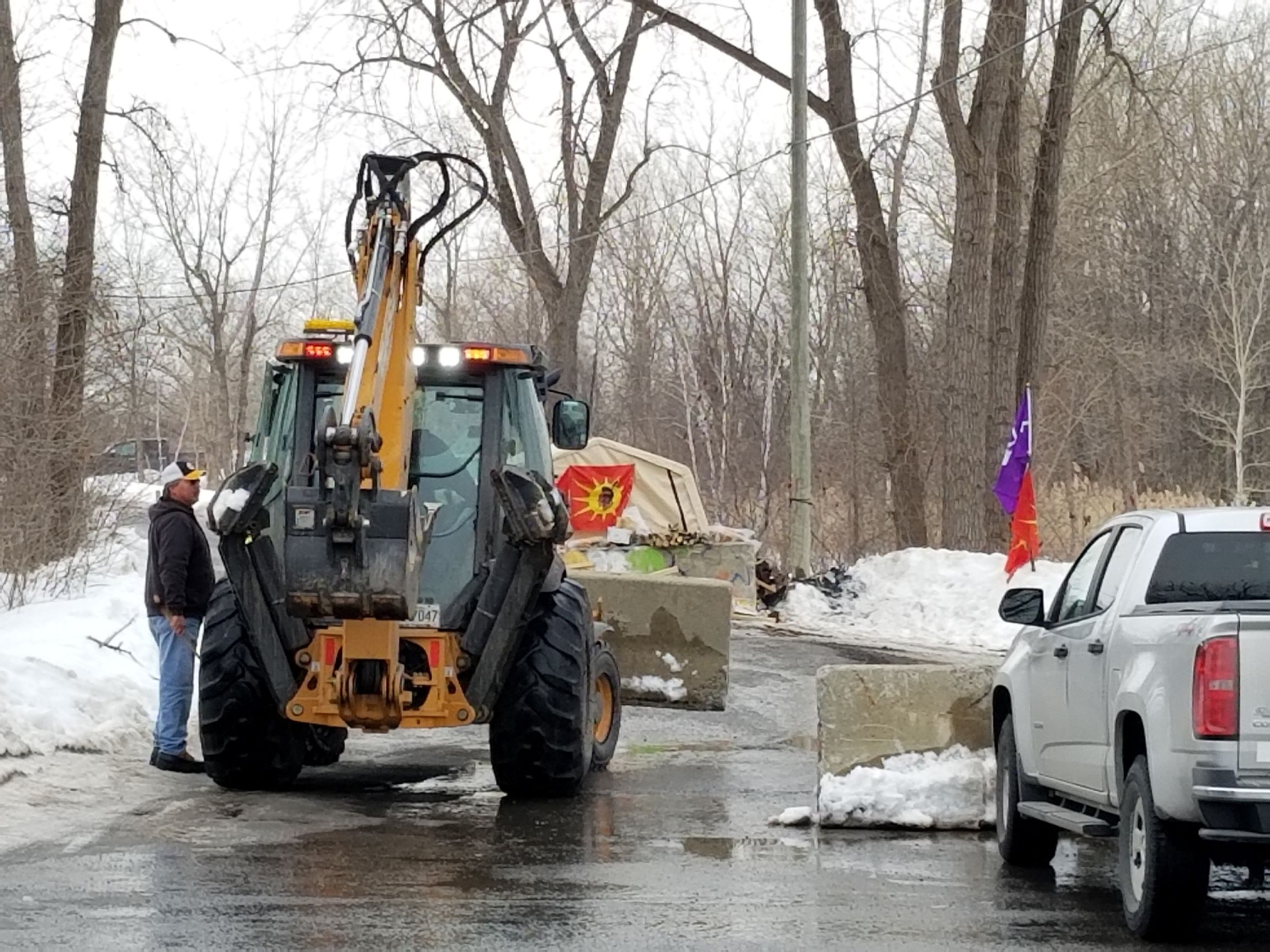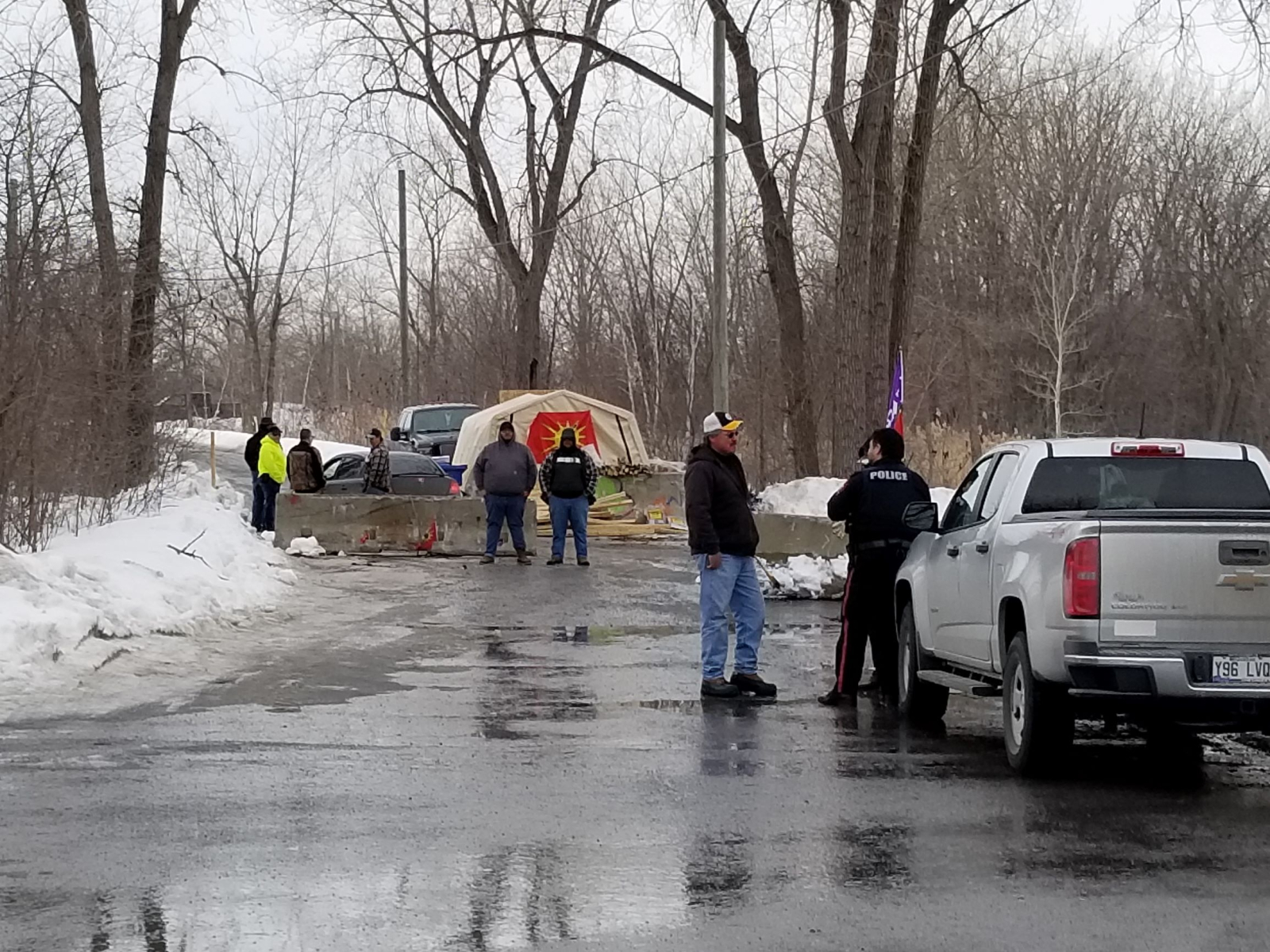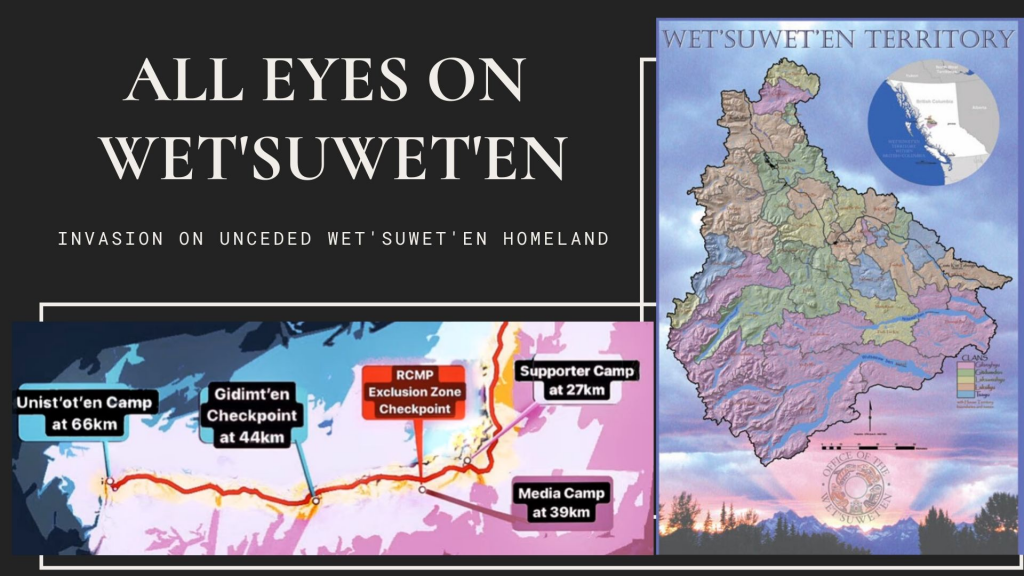Blockades of rail lines, roads, ports and more have been happening across the country in support of the Wet’suwet’en.

CC BY-NC-ND 2.0 Jason Hargrove
Public pressure is building through mass protests, road, rail and ferry blockades as people across the country are showing their support for the Wet’suwet’en’s right to choose what happens on their unceded ancestral land.
Coastal GasLink (formerly TransCanada) is proposing a 670-kilometre pipeline that would carry fracked natural gas from Dawson Creek to Kitimat in British Columbia where it would be processed in a new liquefied natural gas plant on the coastal shore. A portion of the pipeline runs through these Indigenous lands.
For years, Wet’suwet’en Hereditary Chiefs have been saying “no” to the Coastal Gaslink (CGL) pipeline project. When the corporation started moving onto the land, the Hereditary Chiefs asked them to leave. In response, the corporation obtained a court injunction and on February 6, armed RCMP officers forcefully removed the Hereditary Chiefs, Wet’suwet’en land defenders, and their supporters from their own land.
Here are five things you should know about the Wet’suwet’en’s fight for their rights:
1. The United Nations recognizes the rights of Indigenous Peoples and Canada must too.
The Council of Canadians supports Indigenous sovereignty, including the implementation of the United Nations Rights of Indigenous Peoples (UNDRIP).
UNDRIP clarifies the rights of Indigenous Peoples to Free, Prior, and Informed Consent regarding projects that impact their lands and livelihoods. It also clarifies that Indigenous Peoples will not be forcefully removed from their lands. The British Columbia provincial government passed UNDRIP into law in November 2019.
A UN committee has urged the federal government to withdraw the RCMP and immediately suspend work on the pipeline. The RCMP has offered to move its detachment near the Wet’suwet’en camps to Houston, but this is contingent on the Wet’suwet’en allowing CGL to continue to build the pipeline. This is contrary to the eviction notice and would not actually be a removal, as Houston is in Wet’suwet’en territory.
2. The Wet’suwet’en Hereditary Chiefs hold rights and title on ancestral lands that has been recognized by Canadian courts.
Infringing on this right jeopardizes the integrity of how the Canadian and British Columbian governments treat Aboriginal rights and title for the future.
In the 1997 case Delgamuukw v. British Columbia, Canadian courts recognized that the Wet’suwet’en Hereditary Chiefs hold rights and title over ancestral lands. The Hereditary Chiefs have spent years fighting for this recognition in Canadian courts, and achieving it lays the foundation for their ongoing stewardship of ancestral lands in line with the way their community has done for generations. CGL needs their consent to be able to continue building its natural gas pipeline.
It must also be noted that for 23 years, the Canadian government has failed to reconcile its laws and priorities to respect the Supreme Court’s ruling.
Placing a pipeline on this land would permanently alter the on-the-ground context for the rights and title of the Wet’suwet’en Hereditary Chiefs. It violates the principles that the Hereditary Chiefs have successfully fought to have recognized, which they have practiced for generations, and which allow them to continue to care for the land in ways consistent with their traditions. These traditions prioritize the health of the land for the future, which is important in the face of the climate crisis.
3. The authority of Hereditary Chiefs pre-date the authority of Band Councils.
Hereditary Chiefs represent different houses that make up the First Nation as a whole. Their titles are passed down through generations and pre-date colonization. According to the First Nations Drum, “the Wet’suwet’en nation is made up of five clans, and within those, 13 houses. The five hereditary chiefs representing the clans are all opposed to the Coastal GasLink pipeline running through their territory, while the elected council gave their go-ahead.”
The article goes on to state that, “elected chiefs and council generally hold authority over reserve lands and their infrastructure. Traditional chiefs oversee the territories and hold ceremonial and historical importance to First Nations.” This isn’t a question of taking sides, but of recognizing what the Supreme Court has decided – that it is the Hereditary Chiefs who have jurisdiction over Wet’suwet’en traditional territory.
The Indigenous electoral systems came as a result of the section 74 of the Indian Act, which Canada imposed on First Nations. “It was designed to eradicate the hereditary system and create something more recognizable for the western government,” the article adds.
Both Hereditary Chiefs and Elected Councils are working on behalf of their people and hold unique roles. CGL has exploited the differences of opinion related to this project by moving forward without consent from the full community. Using the injunction from British Columbia, CGL would permanently enforce that division and jeopardize the existing mechanisms for Indigenous Peoples to give or refuse consent.
The Wet’suwet’en Chiefs emphasize their right to protect their lands.
“The Wet’suwet’en Hereditary Chiefs have maintained their use and occupancy of their lands and hereditary governance system for thousands of years. Wet’suwet’en Hereditary Chiefs are the Title Holders and maintain authority and jurisdiction to make decisions on unceded lands.”
4. This is a clear example of corporate capture and how corporations have the power to override fundamental rights.
Government policies are aligned with the interests of Coastal Gaslink, a corporation that will profit from this pipeline as Indigenous rights are sacrificed.
In fact, permanently undercutting the Hereditary Chiefs’ rights and title seems to have been a longstanding corporate goal of Coastal GasLink, in part indicated by the fact that CGL asked local leaders to contract out of those rights for the future. The Canadian government is choosing to hold onto their colonial mandate, mobilizing state violence through the RCMP and corporate interests, instead of aligning government practices to reflect a proper nation-to-nation relationship. Governments – provincial and federal – could choose to honour the Hereditary Chiefs’ right to say “no,” respect that they have refused the pipeline, and shift Canadian legal systems to pave the way for a substantive and just reconciliation.
These events are an example of how governments assume that “Canadian interests” – or, in this case, the interests of a corporation – are prioritized, undercutting Indigenous rights and title, no matter how clearly those rights are recognized within Canadian law.
In addition, the climate crisis means we should be saying no to new pipelines, not allowing oil and gas companies to build them. We must move away from polluting energies, not build new infrastructure to move them. The Council of Canadians has a long history of supporting people and communities that want to protect their land, water and air from polluting extractive industries such as fracked natural gas.

5. Wet’suwet’en Hereditary Chiefs and their supporters have called for peaceful actions in support of their concerns.
Wet’suwet’en Hereditary Chiefs and supporters have asked for disruptive, but peaceful actions because they heighten pressure significantly for policy makers to change their decisions. The level of action makes it clear that people are no longer willing to allow colonial dispossession to take place, and that we support the right of Indigenous Peoples to Free, Prior, and Informed Consent, including the ability to say “no.” The historic injustices, including denying these rights, must end, and it will take people coming together to make that happen.
This moment builds on the history of Indigenous resistance to colonial actions. It is inspiring to see people around the world joining the Wet’suwet’en’s call to action. This situation is tense and complex in many ways, but it is also a way to say that ongoing colonization and dispossession can no longer be tolerated.
Ways to add your support:
There are many ways you can get involved and add your support. If you haven’t already, please write to your Member of Parliament, phone your MP, join local solidarity actions, or read the links below to learn more.
Other Resources:
Wet’suwet’en Crisis: Whose Rule of Law? (The Tyee, Feb 14)
The Wet’suwet’en, Aboriginal Title, and the Rule of Law: An Explainer (First Peoples Law, Feb 13)
Industry, government pushed to abolish Aboriginal title at issue in Wet’suwet’en stand-off, docs reveal (The Narwhal, Feb 7)
Wet’suwet’en: Why Are Indigenous Rights Being Defined By An Energy Corporation? (Shiri Pasternak, Yellowhead Institute, Feb 7)
Corporations don’t seem to understand Indigenous jurisdiction (D.T. Cochrane, The Conversation, January 16, 2019)
Unist’ot’en Supporter Toolkit















/https://www.thestar.com/content/dam/thestar/news/canada/2020/02/10/anti-pipeline-protesters-blocking-vancouver-ports-vow-to-ignore-injunction/protesters_new.jpg)

 All eyes are watching as the Royal Canadian Mounted Police (RCMP) began their invasion on unceded Wet’suwet’en territory. We wanted to provide the map above along with a brief update from our Wet’suwet’en relatives so you can better understand the lay of the land in the fight against TC Energy’s Coastal GasLink pipeline being forced on the homelands of the Wet’suwet’en. Keep scrolling after updates for ways to take action.
All eyes are watching as the Royal Canadian Mounted Police (RCMP) began their invasion on unceded Wet’suwet’en territory. We wanted to provide the map above along with a brief update from our Wet’suwet’en relatives so you can better understand the lay of the land in the fight against TC Energy’s Coastal GasLink pipeline being forced on the homelands of the Wet’suwet’en. Keep scrolling after updates for ways to take action.